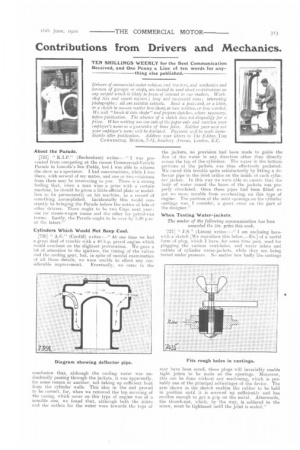Contributions from Drivers and Mechanics.
Page 19

If you've noticed an error in this article please click here to report it so we can fix it.
TEN SHILLINGS WEEKLY for the Best Communication Received, and One Penny a Line of ten words for any thing else published.
Drivers of commercial-motor vehicles and tractors, and mechanics and foremen of garages or shops, are invited to send short contributions on any subject winch is likely to prove of interest to Our readers. Work. shop tips and smart repairs ; long and successful runs ; interesting photographs : all are suitable subjects. Send a post-card, or a letter, or a sketch to us—no matter how short, or how written, or how worded. We will " knock it into shape" and prepare sketche5, where necessary, before publication. The absence of a sketch does not disqualify for a prize. When writing use one side of the paper only and mention your employer's name as a guarantee of bona fides. Neither your own nor your employer's name will be disclosed. Payment will be made immediately after Publication. Address your letters to The Editor, THE COMMERCIAL MOTOR, 7-75, kosebery Avenue, London, E.C.
About the Parade.
[725] " KIT." (Beckenham) writes:—" I was prevented from competing at the recent Onnmercial-Vehicle Parade in Lincoln's Inn Fields, but I was able to witness the show as a spectator. I had conversations, while I was there, with several of my mates, and one or two criticisms from them may be interesting to you. There is a strong feeling that, when a man wins a prize with a certain machine, he should be given a little official plate or medallion to fix permanently on his machine, as a record of something accomplished. Incidentally this would constantly be bringing the Parade before the notice of lots of other drivers. There ought to be two Cups next year : ene for steam-wagon teams and the other for petrol-van teams. Lastly, the Parade ought to he er by 5.30 p.m. at the latest."
Cylinders Which Would Not Keep Cool.
[726] " A.G." (Cardiff) writes:—" At one time we had a great deal of trouble with a 40 h.p. petrol engine which would overheat on the slightest provocation. We gave a lot of attention to the ignition, the timing of the valves and the cooling gear, but, in spite of careful examination of all these details, we were unable to effect any con
siderable improvement. Eventually, we came to the conclusion that, although the cooling water was undoubtedly passing through the jackets, it, was apparently, for smite reason or another, not taking up sufficient. heat from the cylinder walls. This idea in the end proved to be correct, for, when we removed the top covering of the casing, which cover on this type of engine was of a sensible size, wo found that, although both the inlets and the outlets for the water were towards the tops of
the jackets, no provision had been made to guide the flow of the water in any direction other than directly across the top of the cylinders. The water in the bottom portions of the jackets was thus effectively pocketed. We cured this trouble quite satisfactorily by fitting a deflector pipe to the inlet orifice on the inside of each cylinder jacket. In this way we were able to ensure that the bodyof water round the bases of the jackets was properly circulated. Once these pipes had been fitted we got no more trouble from overheating on this type of engine. The position of the mint 'openings on the cylinder castings was, I consider, a great error on the part of the designer."
When Testing Water-jackets
The sender of the following communication has been awarded the 103. prize this week.
-727] " J.S." (Luton) writes :—" I am enclosing herewith a sketch [We reproduce this helow.—En.] of a useful form of plug, which I have, for some time past., used for plugging the various vent-holes. and water inlets and outlets of cylinder water-jackets, while they are being tested under pressure. No matter how badly the castings
may have been cored, these plugs will invariably enable tight joints to be made at the openings. Moreover, this can be done without any machining, which is probably one of the principal advantages of the device. The arm shewn in the sketch enables tho rubber to be held in position until it is screwed up sufficiently and has swollen enough to get a grip on the metal. Afterwards, the thumb-nut, which, by the way, is soldered to the screw, must be tightened until the joint is sealed."




















